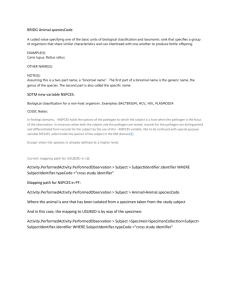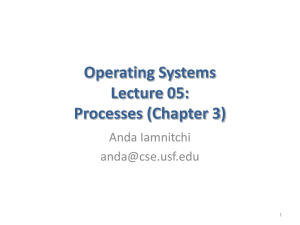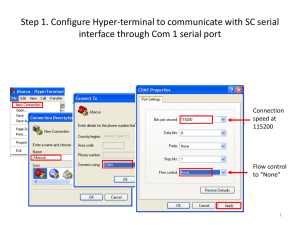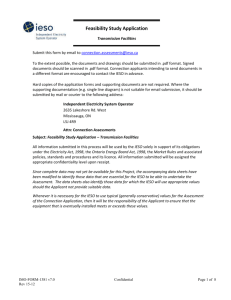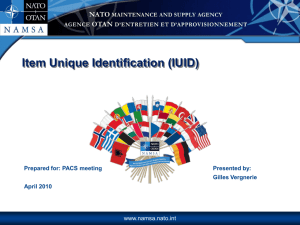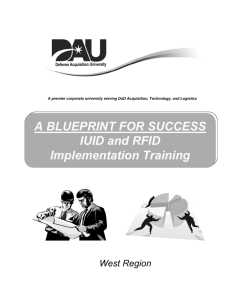Supplier Instruction
advertisement
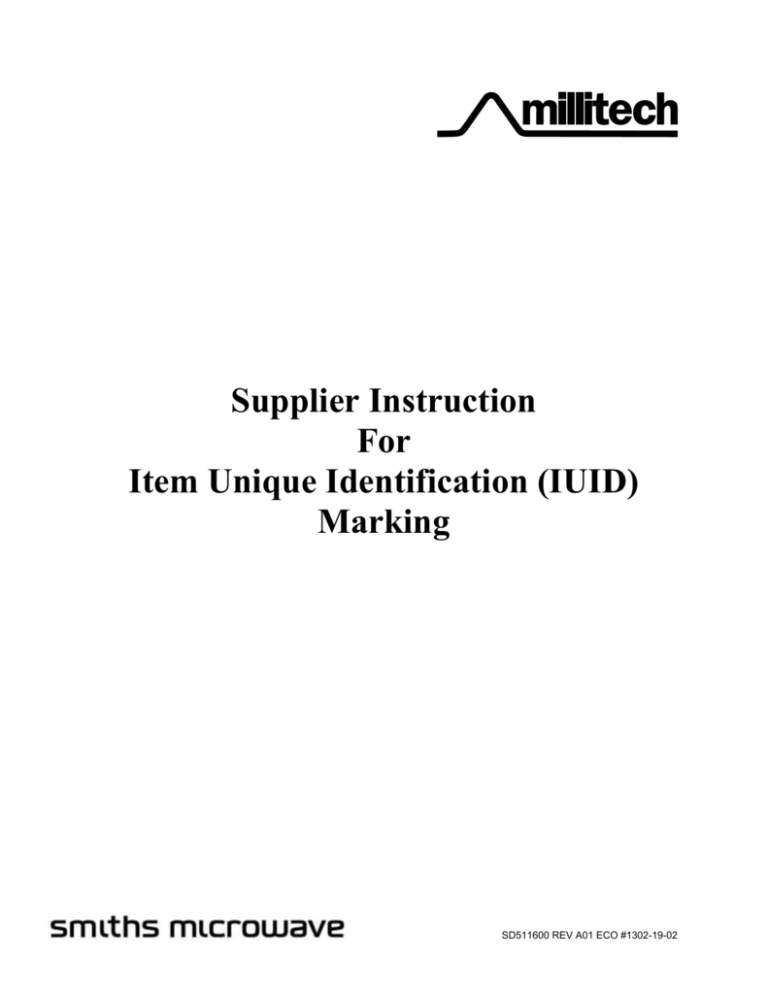
Supplier Instruction For Item Unique Identification (IUID) Marking SD511600 REV A01 ECO #1302-19-02 1. PURPOSE This Supplier Instruction defines the requirements for applying a U.S. Department of Defense (DoD) Item Unique Identification (IUID) mark. A IUID mark consists of an encoded data string applied via a 2dimensional (2-D) data matrix symbol. This Supplier Instruction provides instruction on the format of the encoded data, and the application of a valid 2-D data matrix symbol. This document also details the process for meeting these requirements. A IUID mark is normally required when the U.S. Department of Defense Federal Acquisition Regulations Supplement (DFARS) 252.211-7003 (Item Identification and Valuation) is listed as a contractual requirement. The DFARS clause references MIL-STD-130 (Identification Marking of US Military Property), which in turn regulates the details of the mark. The DFARS clause also references several policy and guideline documents issued by the DoD. It is the intention of this Supplier Instruction to interpret these various generic requirements, and provide specific direction to Suppliers and subcontractors providing material to Millitech for delivery to DoD customers. 2. SCOPE This Supplier Instruction is applicable to all products requiring IUID at Millitech. This document encompasses the application of a valid UID mark. 3. APPLICABLE DOCUMENTS Reference Title MIL-STD-129P w/Change 1 Defense Federal Acquisition Regulation Supplement for Item Identification and Valuation [Updated Final Rule for UID, June 2005] Military Marking for Shipment & Storage MIL-STD-130N Identification Marking of US Military Property DFARS 252.211-7003 ISO/IEC Standard 15434 EAN/UCC Application Identifiers and ASC MH 10 Data Identifiers and Maintenance Syntax for High Capacity ADC Media ISO/IEC Standard 16022 International Symbology Specification - Data Matrix ISO/IEC Standard 15415 Bar Code Print Quality Test Specification - Two-Dimesional Symbols ISO/IEC Standard 15418 Documentation may be found on the DoD UID Website: http://www.acq.osd.mil/dpap/UID. 4. DEFINITIONS, ABBREVIATIONS & ACRONYMS 4.1 Definitions See Appendix A. 4.2 Abbreviations & Acronyms See Appendix B. SD511600 REV A01 ECO #1302-19-02 5. REQUIREMENTS Suppliers shall ensure items identified in Millitech Purchase Orders as requiring IUID marking are properly marked in accordance with DFARS 252.211-7003 and MIL-STD-130 (current version as of this date is MIL-STD- 130N. The following documents provide additional guidance: • DoD Guide to Uniquely Identifying Items - Assuring Valuation, Accountability and Control of Government Property, Version 1.5, 07 June 2005 • Quality Requirements - Quality Considerations for UII - 30Jun2005.pdf • UID - The Basics - 01Jul2005.pdf • Tips on Constructing the UII - 05Jul2005.pdf Documentation may be found on the DoD UID Website: http://www.acq.osd.mil/dpap/pdi/uid/guides.html The following section describes the requirements and methods for applying DoD Item Unique Identification (IUID) on either a nameplate (metal photo process) or a label (thermal transfer process). There are two major considerations in marking the UII. They are 1) the encoded UII data string, and 2) the 2-D data matrix mark. 5.1 UII Encoded Data String An example Millitech UII encoded data string, as encoded in the 2-D data matrix, is included below: [)>RS06GS17V3KKL7 GS 1PG77023-50GS S0157 RS EoT A correct encoded UII data string involves an understanding of the 1) data elements, 2) data identifiers, 3) data element separators, and 4) message header 5.1.1 Construct Type Before a UID is constructed, it is important to note that there are two acceptable methods of serialization: Construct 1 - serialization within the enterprise identifier, and Construct 2 - serialization within the part number. The type of serialization will govern the construction of the UII. Serialization within the enterprise identifier occurs when each tangible item is assigned a serial number that is unique among all the tangible items identified under the enterprise identifier, and is never used again. Serialization within the part number occurs when each tangible item of a particular part number is assigned a unique serial number within the original part number assignment, and the part number – serial number combination is never used again. The method in which Millitech serializes is Construct 2 – serialization within the part number. For items that are serialized within the part number, unique identification is achieved by a combination of the issuing agency code, enterprise identifier, the original part number, and the serial number. Three data elements will comprise the universally unique identification number for each serialized item: • Original Equipment Manufacturer (OEM) identification code [Commercial and Government Entity (CAGE) (preferred), Dun and Bradstreet Number, or UCC.EAN] • OEM part or reference number, and • OEM serial number (single use within OEM part or reference number, per manufacturer identification code) SD511600 REV A01 ECO #1302-19-02 5.1.2 Data Qualifiers 17V, 1P, S Data Identifiers (DIs) enable the customers’ business systems to identify the category of data elements which follow. There are four allowable formats for Data Identifiers - CAGE/NCAGE, DUNS, and EAN.UCC, and Other Agencies – as shown in the table below. Millitech has chosen to use Data Identifiers, Format 06, in order to align with our customer’s requirements. Data Element Enterprise Identifier • CAGE/NCAGE • DUNS • EAN.UCC • Other Agencies Serial Number within Enterprise Identifier Serial Number within Original Part Number DI (Format 06) ISO/IEC 15434 17V 12V 3V 18V (Note 1) ISO/IEC 15434 ISO/IEC 15434 AI (Format 05) ATA CSDD CAG, MFR or SPL (Note 2) DUN EUC 95 SER or UCN (Note 3) S 21 SEQ Original Part Number 1P 01 PNO Lot / Batch Number Concatenated UIIs 1T 25S (Note 4) I (Note 5) 22S (Note 6) 10 8002 (Note 7) 8003 (Note 8) 8004 (Note 9) LOT or BII UID Unique Item Identifier (not including the IAC) 18S (Note 10) Current Part Number (Note 12) 30P USN or UST (Note 11) 240 PNR Notes: Note 1: Data identifier 18V is the concatenation of the Issuing Agency Code (IAC) + Enterprise Identifier (EID). This data identifier would be used for all other EIDs, which were assigned by an issuing agency that has an assigned IAC but does not have their own specific EID data identifier. Note 2: MFR - Manufacturer CAGE Code. Identifies the manufacturer, government agency or other organization controlling the design and the part number assignment of the subject part. SPL - Supplier CAGE Code. The organization assigning a Unique Component Identification Number (UCN), where the organization is not the manufacturer, government agency, or other organization controlling the design of the serialized component. Note 3: SER - Serial Number within Enterprise. The SER is the manufacturer’s serialized identity for an individual part, component or component end item. UCN - Unique Component Identification Number. The UCN is the permanent tracking identity assigned to an in-service part in lieu of the manufacturer’s serial number. Note 4: 25S is a data identifier defined as the identification of a party to a transaction (as identified by data identifier 18V), followed by a supplier assigned serial number (for UII purposes, this has to be unique serialization within the EID that assigns the UII data elements). Thus, for UII purposes, 25S must represent the following string of concatenated elements – IAC + EID + Unique serial number within the EID, which directly corresponds to a concatenated UII using Construct #1. Note 5: DI I identifies a U. S. Vehicle Identification Number – VIN. Note 6: DI 22S identifies a cellular mobile telephone electronic serial number. SD511600 REV A01 ECO #1302-19-02 Note 7: AI 8002 identifies a cellular mobile telephone electronic serial number. Note 8: AI 8003 identifies an EAN.UCC GRAI. Note 9: 8004 is the application identifier for the EAN.UCC Global Individual Asset Identifier (GIAI). The GIAI is up to 30 characters and is a combination of the EAN.UCC Company Prefix and an Individual Asset Reference, which is assigned by the holder of the EAN.UCC Company Prefix. Note 10: In the case where the EID is the CAGE Code, data identifier 18S may be used. 18S is defined as the concatenation of the CAGE Code (EID) + Unique serial number within the CAGE Code. This is UII Construct 1. This data element does not contain the IAC, which must be added. Note 11: USN – The concatenation of MFR + SER. UST – The concatenation of SPL + UCN. These elements do not contain the IAC, which must be added. Note 12: The current part number is not part of the UII. It is an additional data element that may be encoded in the ISO 15434 syntax with the UID and placed on the item in a separate data matrix symbol, or, in the case of severe space limitations, it may be encoded in the same data matrix along with the UII data elements (see MIL-STD-130N). 5.1.3 Data Elements Enterprise Identifier 7W356 Because the Issuing Agency is CAGE, the enterprise identifier is the CAGE code. The CAGE code for Millitech MSD (South Deerfield) is 3KKL7, Millitech MMW (Northampton) is 1 RF10. However, if a Supplier or subcontractor IUID-marks and registers his own equipment in the DoD IUID Registry, the Enterprise Identifier and Issuing Agency used shall be the Supplier’s/subcontractor’s. There may also be instances where Millitech may be required to use the customer’s Enterprise Identifier in the UID, if specified in the contract. Original Part Number 305051-903 The original part number is a combination of numbers and letters assigned by the enterprise (i.e., a customer drawing/specification, manufacturer or supplier) at asset creation to a class of items with the same form, fit, function, and interface. Normally, the part number will be specified by Millitech or customer-owned drawings in many different formats (ex G1299345). Serial Number A1234 The serial number within the part number is a combination of numbers and letters assigned by the enterprise (i.e., a manufacturer or Supplier) to an item that provides for the differentiation of that item from any other like item. Millitech shall normally use the manufacturer/supplier-assigned serial number unless specified otherwise on the purchase order. The data elements of enterprise identifier, original part number and serial number within the original part number provide the permanent identification for the life cycle of the item. However 5.1.4 Data Element Separators RS GS EoT Data Element Separators are indicators to the automated identification technology (AIT) media (e.g., scanner) and business system that a new field has encountered. Data elements separators are nonprintable characters, and can only be programmed using the matrix encoding software. The separators consist of a return separator, group separator, and an end-of-transmission separator. SD511600 REV A01 ECO #1302-19-02 5.1.5 Message Headers [)> 06 A header is string of ASCII characters which the DoD requires at the beginning of the data string. [)> is a three character Compliance Indicator consisting of left bracket, right parentheses, and the greater-than symbol. 5.2 UID Marking MIL-STD-130, DoD Standard Practice for Identification Marking of US Military Property, is the governing document for the application of the 2-D data matrix. There are several important aspects surrounding marking. They are: 1. Marking method 2. Marking media 3. Marking verification 5.2.1 Marking Method There are two basic types of marking allowed in the MIL standard: 1) indirect part marking, and 2) direct part marking. Indirect Part Marking Indirect part marking involves the affixing of a label, nameplate or tag to the end item. Historically, 100% of products delivered by Millitech to DoD customers are marked in this manner. Direct Part Marking Common forms of direct part marking methods include dot-peen, chemical etch, laser etch, and stencil printing. Millitech uses direct part marking where required by customer drawings. 5.2.2 Marking Media At Millitech, the UID will be marked on a nameplate or label, in accordance with the drawing requirements and MIL-STD-130. Each deliverable item requiring IUID marking per the DoD IUID Guidelines has unique location and space available for placing the UII label. Therefore, unless otherwise specified, the supplier shall select appropriate label size sufficient to contain the information required by MIL-STD-130. 5.2.3 Mark Quality Verification To ensure the 2-D data matrix meets the standard, the standard requires that the mark be “verified”. If a mark is readable, this does not necessarily mean that the mark has been verified to meet the standard. Verification involves evaluating the marking against criteria outlined in ISO/IEC standards 16022, 15416 and 15426. In summary: The 2-D data matrix shall be at least a “grade B” and maintain a minimum “grade C” quality over the service life of the item marked. The standard states that for acceptance the symbol shall have a minimum print quality of B/05/660, where the minimum grade is B, measured with an aperture size of 0.127 mm (0.005) with a light source wave length of 660 nm + or - 10 nm. The methodology for measuring the SD511600 REV A01 ECO #1302-19-02 print quality shall be as specified in ISO/IEC 16022. The standard states that the 2-D symbol shall be ECC (Error Correction Code) 200. The standard states that minimum cell sizes and quality levels shall be within a range of 0.0075 inch (0.19 mm) to 0.015 inch (0.38). The matrix symbol shall be selected in accordance with Table 11 of ISO/IEC 16022, for the proper configuration to support the data fields being encoded, and to physically fit on the selected label size for the available label area. For further clarification on mark requirements, please reference the aforementioned ISO Standards. 6. IUII MARK QUALITY VERIFICATION As described in Section 5.2.3, the standard requires that the IUII mark be “verified”. The verification may be performed on each label, or on a sample basis. See Quality Considerations for Unique Item Identifiers, dated June 30, 2005 for additional information. The Government has the right to inspect the IUID label Quality Verification records. Therefore, Millitech requires that the supplier maintain said records, or provide copies of the applicable IUID label Quality Verification reports to the procuring Millitech Business Unit at the time of material shipment. The Data Submission file includes a field for each item to indicate whether the label was verified, and if so, if a copy of the verification report is being submitted to the Millitech Business Unit or if it is being retained by the supplier. SD511600 REV A01 ECO #1302-19-02 APPENDIX A Key Definitions Word or Phrase Automatic Identification Device Definition A device, such as a reader or interrogator, used to retrieve data encoded on machine-readable media. 252.211-7003 Concatenate To link together in a series or chain. Merriam-Webster Online Dictionary Concatenated unique item identifier 1. For items that are serialized within the enterprise identifier, the linking together of the unique item identifier data elements in order of the issuing agency code, enterprise identifier, and unique serial number within the enterprise identifier; or 252.211-7003 Controlled inventory Custodian Data carrier 2. For items that are serialized within the original part, lot or batch number, the linking together of the unique item identifier data elements in order of the issuing agency code, enterprise identifier, original part, lot or batch number, and serial number within the part, lot or batch number. Those items that are designated as having characteristics that require that they be identified, accounted for, segregated, or handled in a special manner to ensure their safeguard and integrity. Includes classified items (require protection in the interest of national security), sensitive items (require a high degree of protection and control due to statutory requirements or regulations, such as precious metals; items of high value, highly technical, or hazardous nature; and small arms), and pilferable items (items having a ready resale value or application to personal possession, which are especially subject to theft) (See DoD 4100.39M, Volume 10, Table 61); and safety controlled items. The enterprise that has stewardship accountability of an item, i.e., responsibility for the control of, transfer and movement of, and access to, equipment and material. Custody also includes the maintenance of accountability for equipment and material. The medium selected to record, transport or communicate data. For unique identification purposes, the data carrier is the Data Matrix symbol. Source Based on the definition of “custody” from the JCS DoD Dictionary The American Heritage Dictionary SD511600 REV A01 ECO #1302-19-02 Data Matrix A two-dimensional matrix symbology containing dark and light square data modules. It has a finder pattern of two solid lines and two alternating dark and light lines on the perimeter of the symbol. A two-dimensional imaging device such as a charge coupled device camera is necessary to scan the symbology. Data Matrix is designed with a fixed level of error correction capability. It supports industry standard escape sequences to define international code pages and special encodation schemes. Data Matrix is used for small item marking applications using a wide variety of printing and marking technologies. The data matrix symbol looks like this: See ALSI/AIM BC11 International Symbology Specification –Data Matrix Data qualifier A specified character (or string of characters) that immediately precedes a data field that defines the general category or intended use of the data that follows. A system of marking items delivered to the Department of Defense with unique item identifiers that have machine-readable data elements to distinguish an item from all other like and unlike items. Items are marked with a Data Matrix, the contents of which are encoded in the syntax of ISO/IEC 15434 and the semantics of ISO/IEC 15418 or the ATA CSDD. [Text Element Identifiers are 252.211-7003 identification (Formerly known as DoD unique item identification.) 211.274 taken from the Air Transport Association Common Support Data Dictionary (ATA CSDD).] The Data Matrix contents may DoD serially managed items be either a Unique Item Identifier (Construct #1 or Construct #2) or a DoD-recognized IUID equivalent. Includes reparable items down to and including subcomponent reparable unit level; life-limited, timecontrolled, or items requiring records (e.g., logbooks, aeronautical equipment service records, etc.); and items that require technical directive tracking at the part level. A distinction must be made between “serialized items” and “DoD serially managed” items. While DoD may use an item that has been serialized by the manufacturer, DoD may not manage the item by means of its serial number. When DoD elects to serially manage an item it becomes "DoD serially managed". This means it is a tangible item used by DoD, which is designated by a DoD, or Service Item Manager to be uniquely tracked, controlled or managed in maintenance, repair and/or supply by means of its serial number. DUSD(Logistics & Material Readiness) Memorandum, September 4, 2002, Serialized Item Management [A serial number is an assigned combination of numbers and/or letters to an item instance that separately identifies that item instance from all others] SD511600 REV A01 ECO #1302-19-02 DoD-recognized Unique identification equivalent End Item Enterprise Enterprise identifier Equipment Innate serialized identity Issuing agency A unique identification method that is in commercial use and has been recognized by DoD. The IUID equivalents are the Global Individual Asset Identifier (GIAI), Global Returnable Asset Identifier (GRAI), Vehicle Identification Number (VIN), and Electronic Serial Number ((ESN), for cell phones only). While the constructs are equivalent, they must be placed on the items in a Data Matrix symbol encoded with ISO 15434 syntax and semantics of ISO 15418 in order to be compliant with DoD IUID policy. A final combination of end products, component parts, and/or materials ready for its intended use, e.g., a ship, tank, mobile machine shop, or aircraft. The entity (e.g., a manufacturer or Supplier) responsible for assigning unique item identifiers to items. A code that is uniquely assigned to an enterprise by a registered issuing agency. A tangible article of personal property that is complete in-and-of itself, durable, nonexpendable, and needed for the performance of a contract. Equipment generally has an expected service life of one year or more, and does not ordinarily lose its identity or become a component part of another article when put into use. Includes military equipment, support equipment, general-purpose equipment, special test equipment, and special tooling. Includes Class VII, Major End Items, a final combination of end products that is ready for its intended use, that is, launchers, tanks, mobile machine shop, and vehicles, etc. It does not include real property, repairables, consumables or materials. The essential inherent data elements that are physically and permanently placed on an item at original manufacture, subsequent overhaul, or during operations to distinguish it from all other like items, which can be read from either a human or machine-readable format. For contractors with possession of Government property, this may be the asset identification number they use to track the item. An organization responsible for assigning a nonrepeatable identifier to an enterprise (i.e., Dun & Bradstreet's Data Universal Numbering System (DULS) Number, Uniform Code Council (UCC)/EAN International (EAN) Company Prefix, or Allied Committee 135 Commercial and Government Entity (CAGE) Code). 252.211-7003 AP16.33 4140.1R 252.211-7003 252.211-7003 4140.1-R Adapted from the definition of “innate” and “serial” in the American Heritage Dictionary and the definition of “unique item identifier” listed below. 252.211-7003 SD511600 REV A01 ECO #1302-19-02 Issuing agency code A code that designates an agency with authority to issue unique enterprise identifiers. 252.211-7003 Item A single hardware article or unit formed by a grouping of subassemblies, components, or constituent parts. 252.211-7003(a) Item essentiality A measure of an item's military worth in terms of how its failure (if a replacement is not immediately available) would affect the ability of a weapon system, end item, or organization to perform its intended functions. AP16.61 4140.1-R identification Sufficient data to establish the essential characteristics of an item that give the item its unique character and differentiate it from other supply items. 4140.1-R Legacy items DoD-owned items and end items that have already been produced and deployed for use, or that have been produced and placed in inventory or storage pending issue for use. USD(AT&L) Memorandum, dated 23 Dec 04, Policy for Unique Identification (UID) of Tangible Personal Property Legacy Items in Inventory and Operational Use, Including Government Furnished Property (GFP) Lot/Batch number An identifying number assigned by the enterprise to a designated group of items, usually referred to as either a lot or a batch, all of which were manufactured under identical conditions. 252.211-7003 Machine-readable media An automatic information technology media, such as bar codes, contact memory buttons, radio frequency identification, or optical memory cards. 252.211-7003 Marking The application of legible numbers, letters, labels, tags, symbols, or colors to ensure proper handling and identification during shipment and storage. 4140.1-R SD511600 REV A01 ECO #1302-19-02 Material Mission essential materials and supplies Original part number Parent item Permanent Part Mark Personal property Pilferable items Property accountability record Of, composed of, or pertaining to physical substances. Materials are items that may lose their identity when incorporated in an end item. (e.g., sheet metal). Property that may be incorporated into or attached to a deliverable end item or that may be consumed or expended in performing a contract. It includes assemblies, components, parts, raw and processed materials, and small tools and supplies that may be consumed in normal use in performing a contract. A measure of an item's military worth in terms of how its failure (if a replacement is not immediately available) would affect the ability of a weapon system, end item, or organization to perform its intended functions. Personal property to be consumed in normal operations. Excluded are (a) goods that have been acquired for use in constructing real property, (b) stockpile materials, and (c) inventory. FMR, Volume 4, Chapter 4, Operating Materials and Supplies and Stockpile Materials, January 1995. A combination of numbers or letters assigned by the enterprise at asset creation to a class of items with the same form, fit, function, and interface. The item assembly, intermediate component or subassembly that has an embedded item with a unique item identifier or DoD recognized unique identification equivalent. The method used for placing physical identification on a part that is durable, robust, fit for the intended purpose, and will ensure that machine readability (i.e., decode using electronic reading equipment) is satisfactory for the life of the item in all use environments. Property of any kind or any interest therein, except real property. Items that have a ready resale value or application to personal possession and that are, therefore, especially subject to theft. (See DoD 4100.39-M, Volume 10, Table 61) The official record of personal property, including inventory, owned by the Department that is maintained to identify the quantities of items on hand, unit prices, locations, physical condition, receipt and issue records, authorized stock numbers, item descriptions, and other such information necessary to properly account for materiel and exercise other inventory management responsibilities. The American Heritage Dictionary, Office Edition, July 1987 FAR 45 sub 45.3 4140.1-R 7000.14 252.211-7003 252.211-7003 JCS DoD Dictionary E2.1.12.3 5000.64 AP16.104 4140.1R SD511600 REV A01 ECO #1302-19-02 Repairable An item of supply subject to economical repair for which repair (at either depot or field level) is considered in satisfying computed requirements at any inventory level. Examples include aircraft engines, rotors, guidance systems, and electronic circuit boards. DoD 4140.1-R Sensitive items Items that require a high degree of protection and control due to statutory requirements or regulations, such as narcotics and drug abuse items; precious metals; items that are of a high value, highly technical, or a hazardous nature; and small arms, ammunition, explosives, and demolition material. (See DoD 4100.39-M, Volume 10, Table 61) Each item produced is assigned a serial number that is unique among all the tangible items produced by the enterprise and is never used again. The enterprise is responsible for ensuring unique serialization within the enterprise identifier. Each item of a particular part, lot or batch number is assigned a unique serial number within that part, lot or batch number assignment. The enterprise is responsible for ensuring unique serialization within the part, lot or batch number within the enterprise identifier. A set of data marked on items that is globally unique, unambiguous, and robust enough to ensure data information quality throughout life and to support multi-faceted business applications and users. E2.1.12.2 5000.64 A unique identification method that is in commercial use and has been recognized by DoD. All DoD recognized unique identification equivalents are listed at http://www.acq.osd.mil/dpap/UID. 252.211-7003 Serialization within the enterprise identifier Serialization within the part, lot or batch number Unique identification Unique identification equivalent 252.211-7003 252.211-7003 252.211-7003 DoD recognized IUID equivalents are: • • • • Global Individual Asset Identifier (GIAI), Global Returnable Asset Identifier (GRAI), Vehicle Identification Number (VIN), or Electronic Serial Number (ESN), for cell phones only) SD511600 REV A01 ECO #1302-19-02 Unique item Identifier Use. The unique item identifier (UII) is defined in two separate contexts: 252.211-7003 1. DoD UII Data Set. A UII is a set of data elements marked on an item that is globally unique and unambiguous. For items that are serialized within the enterprise identifier, the UII data set includes the data elements of enterprise identifier and a unique serial number (Construct #1). For items that are serialized within the part, lot or batch number within the enterprise identifier, the UII data set includes the data elements of enterprise identifier, the original part, lot or batch number, and the serial number (Construct #2). 2. The generic term, UII, has evolved through usage to mean the concatenated UII as a common data base key without regard to the data set construct being used. In this context, the term “UII” may be used to designate UII Constructs #1 and #2, or the DoD recognized IUID equivalents of Global Individual Asset Identifier (GIAI), Global Returnable Asset Identifier (GRAI), Vehicle Identification Number (VIN), or Electronic Serial Number ((ESN), for cell phones only). Unit acquisition cost 1. For fixed-price type line, sub-line, or exhibit line items, the unit price identified in the contract at the time of delivery; and 252.211-7003 2. For cost-type line, sub-line, or exhibit line items, the Contractor's estimated fully burdened unit cost to the Government for each item at the time of delivery. Virtual unique item identifier The UII data elements for an item that have been captured in a database, but not yet physically marked on the item. DoD Guide to Virtual Unique Item Identifiers, 29 Dec 04 SD511600 REV A01 ECO #1302-19-02 APPENDIX B Abbreviations & Acronyms ACRN Accounting Classification Reference Number ADC Automatic Data Capture AIS Automated Information System AIT Automatic Identification Technology ALS American National Standard ALSI American National Standard Institute ALSI/EIA American National Standard Institute/Electronic Industries Alliance ALSI T1.220 Number North American Telecommunication Industry Manufacturers, Suppliers, and Related Service Companies ASC Accredited Standards Committee ATA Air Transport Association CAG Text Element Identifier for CAGE CAGE Commercial And Government Entity CDRL Contract Data Requirements List CFO Chief Financial Officers CJCSI Chairman of the Joint Chiefs of Staff Instruction CLEI COMMON LANGUAGE® Equipment Identification CLIN Contract Line Item Number CSDD Common Support Data Dictionary published by the ATA D Issuing Agency Code for CAGE Numbers DCMA Defense Contract Management Agency DFARS Defense Federal Acquisition Regulation Supplement DLMS Defense Logistics Management System DoD Department of Defense DoDAAC Department of Defense Activity Address Code DoDD Department of Defense Directive DoDI Department of Defense Instruction DUN Text Element Identifier for DUNS Number DUNS ® Number Dun & Bradstreet Data Universal Numbering System number EAN European Article Numbering EAN.UCC European Article Numbering Uniform Code Council EHIBCC European Health Industry Business Communications Council EIA Electronic Industries Alliance SD511600 REV A01 ECO #1302-19-02 EID Enterprise Identifier ESN Electronic Serial Number EUC Text Element Identifier for EAN.UCC FAR Federal Acquisition Regulation FASAB Federal Accounting Standard Advisory Board FMEA DoD Financial Management Enterprise Architecture FMIP Financial Management Improvement Plan FMMP DoD Financial Management Modernization Program FMR DoD Financial Management Regulation FMS Foreign Military Sales GAO General Accounting Office GIAI Global Individual Asset Identifier GRAI Global Returnable Asset Identifier GTIN ™ Global Trade Item Number ™ HIBCC Health Industry Business Communications Council IAC Issuing Agency Code ID Identification IEC International Electro-technical Commission ISO International Organization for Standardization ISO/IEC 15418 EAN/UCC Applications Identifiers and ASC MH 10 Data Identifiers and Maintenance ISO/IEC 15434 Syntax for High Capacity ADC Media ISO/IEC 15459-2 Unique Identifiers for Item Management IUID Item Unique Identification JCS Joint Chiefs of Staff JRIB Joint Requirements Implementation Board JTC 1 ISO/IEC Joint Technical Committee O LB Issuing Agency Code for ALSI T1.220 Numbers LD Issuing Agency Code for DoDAAC Numbers LH Issuing Agency Code for EHIBCC Numbers MFR Text Element Identifier for CAGE Code of the Manufacturer MIL HDBK Military Handbook MIL STD Military Standard MILSTRAP Military Standard Transaction Reporting and Accounting Procedures MH 10 The US Technical Advisory Group to ANSI SD511600 REV A01 ECO #1302-19-02 NATO North Atlantic Treaty Organization NCAGE NATO Commercial And Government Entity OEM Original Equipment Manufacturer OSD Office of the Secretary of Defense PNO Text Element Identifier for Original Part Number PP&E Property, Plant and Equipment SC 31 ISO Sub Committee 31 (Automatic Data Capture) SER Text Element Identifier for Serial Number assigned by the Manufacturer SEQ Text Element Identifier for Serial Number assigned within the Original Part Number SLIN Sub Line Item Number SPL TC Text Element Identifier for CAGE Code of Enterprise other than the Manufacturer ISO Technical Committee TEI Text Element Identifier TG US TAG Technical Group UCC Uniform Code Council UCN Text Element Identifier for Unique Component Number assigned by Enterprise other than the Manufacturer UID UII Unique Identification; Text Element Identifier for Concatenated Unique Item Identifier Unique Item Identifier UN Issuing Agency Code for DUNS Numbers USD (AT&L) Undersecretary of Defense for Acquisition, Technology and Logistics USN Text Element Identifier of Universal Serial Number formed by Concatenating MFR+SER UST Text Element Identifier of Universal Serial Tracking Number formed by Concatenating SPL+UCN US TAG U.S. Technical Advisory Group VIN Vehicle Identification Number WG ISO Working Group SD511600 REV A01 ECO #1302-19-02
